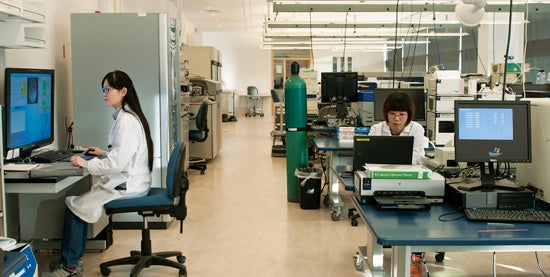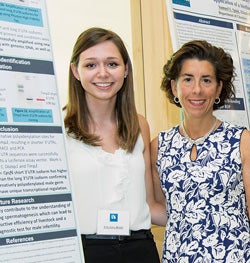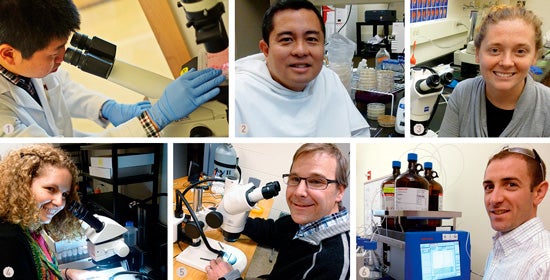The Breakthrough Network

A game-changing, statewide collaboration gives researchers the tools to make biomedical breakthroughs.
By Mary Grady

When Wei Lu, an assistant professor in URI’s College of Pharmacy, won a $1.3 million federal grant last year to study nanoparticle technology that could help fight cancer, he was just one of many researchers to benefit from a statewide program based at URI—the Idea Network for Biomedical Research (INBRE). The program, administered by the National Institutes of Health (NIH), launched in Rhode Island in 2001.
“The idea was to broaden the geographical distribution of NIH funding, which had been concentrated in just a handful of states,” says Zahir Shaikh, the program director and a URI pharmacy professor. “Rhode Island was one of 23 states that had a small amount of grant funding. INBRE was meant to help make the playing field more even.”
To achieve its goals, the program helps junior faculty launch their research careers, and also supports and mentors undergraduate students. “Our charge is to create a network,” says Shaikh.
URI has partnered with six other institutions in the state: Brown University, Rhode Island College, Providence College, Roger Williams, Salve Regina, and Bryant University. CCRI is also involved in an outreach capacity. Professors at the start of their careers are provided with mentoring and financial support, usually for about three years, to help them establish their own research programs. Once they have accumulated more experience and preliminary research results, they’re better prepared to tackle the daunting task of finding the financing they need to be independent. “Faculty we’ve supported have brought in about $50 million in their own grants,” says Shaikh. “That’s the whole idea—to build the infrastructure and support so they are more competitive when they apply for funding, and biomedical research in the state will grow.”
A key part of that infrastructure development is the Centralized Research Core Facility, which has been established in the pharmacy building on URI’s Kingston campus. Al Bach, the facility coordinator, ensures that the lab has the instrumentation researchers need, and also teaches faculty and students how to use the equipment. “We also can help researchers to design their experiments,” says Bach. “We help them in any way we can.”
The equipment is constantly being updated—early this year, the lab acquired a new high-resolution Nikon inverted confocal microscope, which can do complex work but is simple to operate. A new mass spectrometer was acquired just last year, and the lab also has an RNA/DNA synthesizer, a protein sequencer, and a wide range of other instruments.

2. Providence College Professor and priest Nicanor Austriaco’s early INBRE-funded work earned him two NIH grants to support genetic cancer research in his lab.
3. Providence College Professor Marla Tipping is using her INBRE funding to train undergraduates as they research metabolic treatments for brain tumors.
4. Brown Professor Karla Kaun studies molecular mechanisms of alcohol addiction in fruit flies with INBRE funding.
5. Rhode Island College Professor Geoff Stilwell, along with Brown University, uses INBRE funding to develop genetically identical mutant fruit flies to find a cure for neurodegenerative diseases like Parkinson’s, Alzheimer’s, and ALS.
6. Providence College Professor Seann Mulcahy’s INBRE-funded research results helped him win the New Investigator Award from the ACS Petroleum Research Fund.
INBRE has invested more than $4 million so far in the core lab, says Shaikh. “It’s a unique facility in the state,” he said. “No other facility has the concentration of all this instrumentation and staff support in one place. And it’s available not only to the students and faculty at URI, but also to all the member institutions.”
Another key program for INBRE is the Summer Undergraduate Research Fellowship (SURF), which pulls from a number of funding sources to provide a paid, 10-week research experience to promising students. Brenton DeBoef, from URI’s chemistry department, is the SURF director. “I went through programs similar to this as an undergraduate,” says DeBoef. “So I’m a big fan.” During the school year, the program provides additional funding to keep students working on research projects. INBRE also hosts a statewide conference every summer at URI where participating students can share the results of their research. “It’s unbelievable,” says DeBoef, adding that the level of work, and enthusiasm, is high and seems better every year. “It’s top notch. It’s really great.”
The program is intensely competitive, DeBoef says, and he hopes it will continue to grow. Every year, he said, he has applicants from more well-qualified students than the program can accommodate, and the same is true for mentors.
Shaikh said the statewide support for undergraduate research already has had a profound impact. “The undergrad institutions now are more interested in encouraging their faculty to do research, not to only concentrate on teaching,” he says. “It’s really changing the culture at the undergraduate universities.”
At Rhode Island College, two undergraduates in biology won first place at a 2013 regional conference for their report on research they completed working in the lab with Rhode Island Hospital’s Deborah Britt Ph.D. ’91, funded by SURF. “We were in shock when we heard our names called as first-place winners,” said student Sabrina Elgar. “It was so exciting to be there. At one of the sessions, they talked about how important it is to fund undergraduate research, and I thought, what if I hadn’t had these opportunities, because the funding wasn’t there? And I realized what a difference it makes.”
The majority of students who benefit from INBRE support go on to graduate school and complete their doctorate degrees, says Shaikh.
With all of those pieces in place, says Shaikh, INBRE has made progress in its goal of helping biomedical research in the state to grow. And the NIH agrees. “Last year we got funded for five more years, for $18.8 million,” says Shaikh. That newest grant brings the total amount of NIH funding awarded to URI for INBRE since 2001 to $61 million. That’s a massive step toward levelling the playing field for research dollars in Rhode Island—and saving lives.•
 Home
Home Browse
Browse Close
Close Events
Events Maps
Maps Email
Email Brightspace
Brightspace eCampus
eCampus


